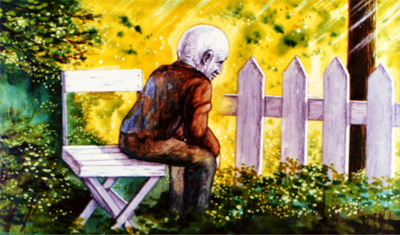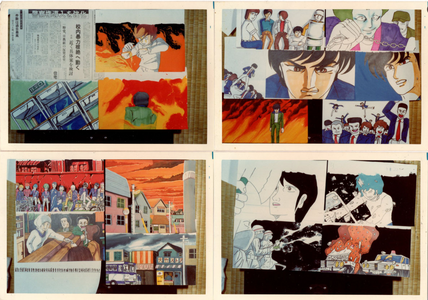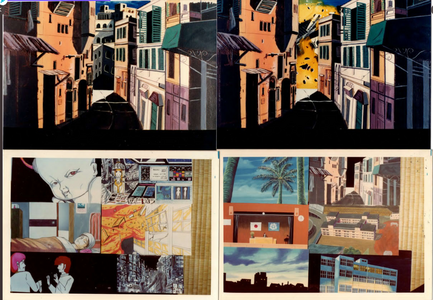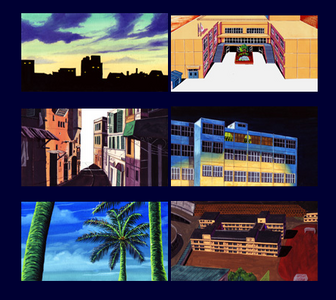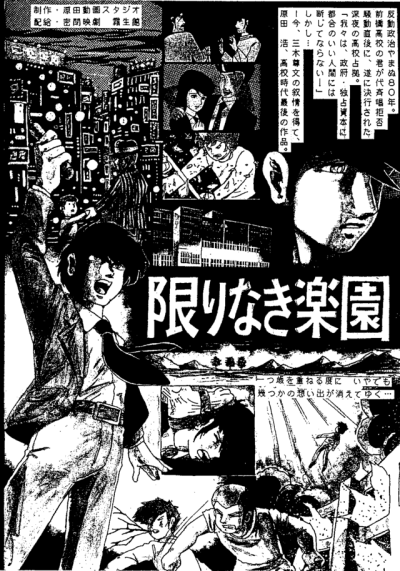Kagirinaki Rakuen (found amateur Hiroshi Harada anime film; 1981)
A still from Kagirinaki Rakuen, taken from a film camera.
Status: Found
Date found: 02 Jul 2023
Found by: Kiryukan
Kagirinaki Rakuen (限りなき楽園), or in English and better known as Limitless Paradise, is a 40-minute[1] amateur anime film directed, animated and made completely by Hiroshi Harada in 1981[1][2], an animator notoriously known for his works in the "ero-guro" genre and for his controversial film, Midori.[1]. It was then screened in the following years in 1982, 1986 and lastly in 1988[1] and since then, has never been shown publicly and released in any form, prior to July of 2023.
Plot
Harada had explained a brief rundown of the film[1] that came from his blog which contains most of the information about Kagirinaki Rakuen. The rundown goes as follows:
高校生達が学校への不満から、高校を占拠し立てこもる。 しかし明確な方針や理念を持たなかった生徒達は やがて分裂を起こしてバラバラになってしまうというストーリー。
When translated to English, it goes as follows:
High school students occupy the high school out of dissatisfaction with the school. However, the story is that the students who do not have a clear policy or philosophy eventually split and fall apart.
Original Strip
Harada had worked and made this film in his third year in high school in an 8mm film strip using patch tape, rather than a roll splicing tape. This, unfortunately, caused it to degrade in the quality and health of the film strip. Additionally, it also got heavily damaged by the wind entering the strip's surface and the sweltering heat[1], as it caused various audio and visual damages to the entire film.[1]
Content
Aside from a rundown of the film's plot, there are three songs that are confirmed to have been used in the film[1], one is a song entitled "Child's Mind", an original song which was written and sung by Takafumi Miki (Harada's friend), and arranged by Harada himself.[3] Another song, entitled "St. Louis Blues", an original song by Harada's cousin[1], and Tchaikovsky's Symphony No. 4.[1] Additionally, Harada had composed an original score for the film that he had written when he was 16, entitled in the same name as his film, "Limitless Paradise", using a Porta Sound, a Yamaha DX100, and an RX2.[4]
Availability
Aside from a few screenings of the film in 1982, 1986, and lastly in 1988[1], the film was never shown publicly again. Though, Harada himself had expressed embarrassment and contemplation about the film's release[4][1][5]. Additionally, with the original 8mm film strip being heavily damaged, it is likely to take a long time for it to be fully digitized. Aside from that, multiple advertisements for the film have been uploaded by different users and are available online to be viewed.[6]
On December 22nd, 2020, Kiryukan, the production company that was founded by Hiroshi Harada himself, posted a Twitter thread to their official support team Twitter account, @kiyubaru. The thread in question includes various stills, drawings, and plot details about Limitless Paradise, which contains, for the first time in 33 years since it had been last seen, footage from the film, albeit was re-shot.[7][8][9].
Release
After 35 years of absence from its last confirmed screening in 1988, on July 2nd, 2023[10], the official Kiryukan website would announce that they have uploaded the full 40-minute Hiroshi Harada film, "Kagirinaki Rakuen" (Limitless Paradise), on their official support team Facebook account, Kiyubaru きゆばる[11], marking it as the first time in 35 years that the film would be seen and viewed again by the public.
Gallery
Footage
Stills
Advertisements
Songs
Videos
See Also
Other Hiroshi Harada Films
External Links
Videos
Other Links
- AnimeNewsNetwork page about Hiroshi Harada and his works.
- Hiroshi Harada's blog site and portfolio.
- Hiroshi Harada's production company, Kiryukan''s official page.
- MyAnimeList forum thread on Limitless Paradise
- r/LostMedia post and thread on Limitless Paradise
- Another r/LostMedia post and thread on Limitless Paradise
- LMW Forums thread on Limitless Paradise
References
- ↑ 1.00 1.01 1.02 1.03 1.04 1.05 1.06 1.07 1.08 1.09 1.10 1.11 Limitless Paradise' entry on Hiroshi Harada's official blog site. Retrieved 06 Jan '23
- ↑ MyAnimeList page on Limitless Paradise Retrieved 06 Jan '23
- ↑ "Child's Mind" description that credits Harada and Miki. Retrieved 06 Jan '23
- ↑ 4.0 4.1 Harada's blog post about his original score "Limitless Paradise". Retrieved 06 Jan '23
- ↑ Kiryukan's Twitter Status on Harada's thoughts on having Limitless Paradise release Retrieved 06 Jan '23
- ↑ Tumblr blog post on Limitless Paradise advertisement Retrieved 06 Jan '23
- ↑ Kiryukan's Twitter Status about Limitless Paradise. Retrieved 06 Jan '23
- ↑ Kiryukan's Twitter Status on the re-shot footage of the film. Retrieved 06 Jan '23
- ↑ Archive.org link on the footage from Kiryukan's official channel, Retrieved 06 Jan '23
- ↑ July 2, 2023 announcement of the film's upload on their Facebook page on the official Kiryukan website Retrieved 03 Jul '23
- ↑ The full film, uploaded by Kiryukan on Facebook. Retrieved 03 Jul '23
